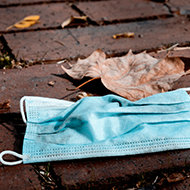
Non-recyclable face masks pose a 'significant' threat to UK wildlife
Commercial recycling company Tradewaste has created a petition urging the Government to ban 'environmentally damaging' disposable face masks.
The company states that it is not asking the Government to completely ban the sale of these disposable face masks, as they play an important role in the medical field and in helping to curb the spread of COVID-19. However, single-use, non-recyclable face masks present a 'significant threat' to Britain's wildlife and environment.
Tradewaste.co.uk predicts that – if wearing face masks is mandatory throughout 2021 – the UK will send 19.2 million face masks to landfill.
The RSPCA has reported nearly 1000 incidents of animals becoming caught in litter across 2020 and the charity has expressed concerns that discarded face masks are a new significant hazard, particularly to wild animals and birds.
Charlotte Green from Tradewaste.co.uk said: “It’s really important to consider the wider impact of the single-use face masks we all wear, they are thrown away in streets, ending up in watercourses, rivers and the sea – that’s why we are supporting a new petition on the Government to ban their sale to the general public.
“We are promoting the petition to raise awareness of the environmental problems created by single use face masks, and also to offer an alternative to those worried about the harm cause to wildlife and the impact on the environment in the UK.”
The campaign is aiming to reach 100,000 signatures by the end of 2020 to slow the consumption of disposable face masks. Once the petition reaches this number, it will be discussed in Parliament.
A link to the petition can be found here.



 The Veterinary Medicines Directorate (VMD) is inviting applications from veterinary students to attend a one-week extramural studies (EMS) placement in July 2026.
The Veterinary Medicines Directorate (VMD) is inviting applications from veterinary students to attend a one-week extramural studies (EMS) placement in July 2026.